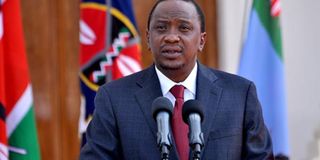President Kenyatta blames Anglo Leasing pay on AG

President Kenyatta addresses a press conference at State House Nairobi on May 16, 2014. He blamed lawyers in the State Law Office for failing to defend the Government’s position on the Anglo Leasing contracts competently. PHOTO | SALATON NJAU
What you need to know:
- The President said it was better to pay and clear the way for Kenya’s issue of a Euro Bond which the government hopes will fetch Sh132 billion
- Anglo Leasing involved contracts entered in between 1997 and 2003 for the delivery of security services for the government
International pressure and second-rate performance by the State Law Office condemned Kenya into paying for the controversial Anglo Leasing contracts, President Kenyatta said on Friday.
He tore into the Attorney General’s office and demanded that they “up their game” in fighting the country’s legal battles abroad.
The revelation formed the core of the President’s argument that Kenya had no choice but to pay Sh1.4 billion to two controversial firms, after losing cases to them in London and Geneva.
“We must up our game so that our counsel can stand by what all Kenyans including myself believe that we should not be paying this and we need to be able to win all those court battles in the courtroom,” he told journalists at State House, Nairobi.
“Unfortunately, out there in the international community, they are not interested in our debate here; they are interested in the ruling of the courts and whether Kenya has obeyed the ruling of the court or not,” said the President, who on Thursday authorised the National Treasury to pay Sh1.4 billion to First Mercantile Securities Corporation and Universal Sat Space, which took the country to courts in London (2013) and Geneva (2012), for breach of contract. First Mercantile won $10.6 million while Sat Space was awarded $7.8 million.
The two companies had signed contracts worth Sh2.9 billion with Kenya but the court awards meant Kenya had to pay an equivalent of Sh1.6 billion. Treasury officials have argued they negotiated the figure down to Sh1.4 billion, but which would balloon to Sh96.6 billion including interest rates, if Kenya failed to pay.
When he tabled a Parliamentary Accounts Committee report on the procurement of passports in 2006, President Kenyatta, then the committee’s chair, observed that the contracts represented “impunity, negligence and recklessness in the management of public resources.” He called them a “scam” given the way insiders in government colluded with faceless firms to dupe the government into paying interests and fees on items that were not delivered.
On Friday, Mr Kenyatta said he still stood by those words since only the circumstances have changed.
“That position still stands, but the fact of the matter is, that was a parliamentary report. I was not counsel representing this nation in the courts in London and in Geneva at the arbitration. We didn’t lose our battle in the National Assembly; we lost our battle in the courts out there.
“Despite that particular standing, there is a ruling in an international court that has made demands that Kenya must pay. We lost the case, we didn’t win it. The fact that we didn’t win it doesn’t mean that I have changed my position, I maintain my position.”
EURO BOND
The President said it was better to pay and clear the way for Kenya’s issue of a Euro Bond which the government hopes will fetch Sh132 billion to finance the next budget. Failure to pay would mean Kenya would not secure approval to issue the bond as it would be deemed to have dishonoured its international obligations, he said.
On the possibility that the payment could open up an avenue for other firms to sue for compensation, claiming they were not paid, President Kenyatta said it was the duty of the Attorney-General to prevent such an eventuality.
Anglo Leasing involved contracts entered in between 1997 and 2003 for the delivery of security services for the government which included a forensic lab, passport equipment and technological improvement for the Postal Corporation. They were worth Sh55 billion.
But the government then did not have money so it entered lease-financing and credit and supplier credits to circumvent the departure of financial donors. According to the Treasury, 11 contracts (Sh30.5 billion) were partially completed, four of which worth Sh18.9 billion were cancelled and three worth Sh6.8 billion were fully delivered.
However, of the five remaining (Sh13.8 billion), Kenya paid contractual penalties worth Sh7.9 billion to two, one is still being negotiated while two were subjected to court proceedings in London and Geneva.





